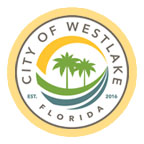The Westlake City Council on Monday, Feb. 10 approved a new qualifying period for council candidates. The new dates will be Tuesday, Feb. 25 through Friday, March 6. The action was taken after an advertising error was discovered regarding the previous qualifying period.
City Attorney Pam Booker said that when the council set the qualifying dates by ordinance at two meetings in December to comply with the Palm Beach County Supervisor of Elections Office’s dates to hold the Tuesday, March 31 election, it was discovered that the second reading had not been properly advertised.
“According to law, that entire process is invalid, so we’re back here tonight to set those dates,” Booker said. “The supervisor of elections is able to print ballots in a timely fashion. Therefore, she is still able to accommodate us and have the election on March 31.”
Booker explained that the first reading of the new ordinance resetting the dates would be that evening, with the second reading set for Feb. 24. Qualifying will then open on Tuesday, Feb. 25 and close Friday, March 6.
She added that candidates who qualified in the previous period would be able to use the same paperwork. However, new candidates may emerge.
During the qualifying period ending Jan. 14, candidate Patric Paul qualified to run unopposed for Seat 1, while candidates Jeffrey Keller and John Paul O’Connor qualified to run for Seat 3.
“There is a modification that is before you… [that] will allow the candidates to qualify for election during the last qualification period to keep their designation of their treasurer and their account,” Booker said. “Those forms will still be valid.”
Councilman Phillip Everett made a motion to approve the ordinance’s first reading, which carried 4-0 with Vice Mayor Katrina Long-Robinson absent.
In other business, the council approved final reading of an ordinance regulating off-street parking and loading.
Westlake Planning Consultant Nilsa Zacarias said the first reading of the ordinance passed in October, and she reviewed changes that had been made since then.
For single-family attached dwellings, off-street parking will be provided within 360 feet of the dwelling. Residential parking space was reduced from 9 feet by 20 feet to 8.5 feet by 20 feet. Queuing for teller lanes and ATM lanes was decreased from five to three, and from three to two, respectively.
Valet parking requirements were clarified and made consistent for all uses. Language for loading areas was also clarified, and developers who want to deviate from the code would have to provide studies to justify the deviation, to be reviewed by the city engineer.
“The spirit of this is to protect our single-family neighborhoods,” Zacharias said. “No off-street loading shall be located within 100 feet of a single-family residential developed area.”
For multi-family dwellings, the number of parking spaces was set at one space per bedroom, and a minimum of five percent of spaces for guest parking.
Councilwoman Cara Crump made a motion to approve the final reading of the ordinance, which passed 4-0.
The council also approved the first reading of an ordinance regulating the sale and consumption of alcoholic beverages in the community.
Booker said the ordinance had been before the council previously for review, and some minor typographical errors had been corrected.
Provisions include a 1,500-foot minimum distance for outdoor entertainment from a residential property. Cocktail lounges, breweries and bars must have 200 feet of separation in the downtown mixed-use area, and they can’t be adjacent to one another.
The ordinance also provides for classification of vendors and distributors, as well as licensing of non-restaurant retail beverage stores and retail liquor stores; provides advertising guidelines for retail beverage stores and retail liquor stores situated within a hotel or restaurant; and provides for payment of excise taxes and the sale of license-specific alcoholic beverages.
The ordinance also provides operating hours for retail package stores, liquor and beverage stores and club vendors. It prohibits delivery of alcoholic beverages on Sunday and also provides restrictions on public consumption in public places and certain private places.
Crump made a motion to approve the first reading of the ordinance, which carried 4-0.








